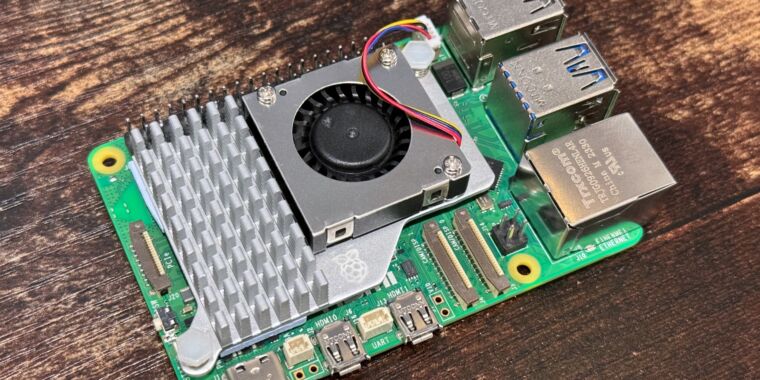Andrew Cunningham
We’re many months past the worst of the Raspberry Pi shortages, and the board is finally widely available at its suggested retail price at most sites without wait times or quantity limitations. One sign that the Pi Foundation is feeling more confident about the stock situation: the launch of a new 2GB configuration of the Raspberry Pi 5, available starting today for $50. That’s $10 less than the 4GB configuration and $30 less than the 8GB version of the board.
Raspberry Pi CEO Eben Upton writes that the 2GB version of the board includes a revised version of the Broadcom BCM2712C1 SoC that is slightly cheaper to manufacture. Upton says that the D0 stepping of the BCM2712C1 strips out some “dark silicon” built-in functionality that the Pi wasn’t using but was still taking up space on the silicon die and increasing the cost of the chip.
“From the perspective of a Raspberry Pi user, [the chip] is functionally identical to its predecessor: the same fast quad-core processor; the same multimedia capabilities; and the same PCI Express bus that has proven to be one of the most exciting features of the Raspberry Pi 5 platform,” Upton writes. “However, it is cheaper to make, and so is available to us at somewhat lower cost. And this, combined with the savings from halving the memory capacity, has allowed us to take $10 out of the cost of the finished product.”
At $50, the price tag is still north of the baseline $35 price that the Pi started at for many years. The Pi 4 had a 1GB model for $35 when it launched, and there was a $35 2GB model available for a while in 2020, but widespread shortages and supply chain issues led to a “temporary” price increase in late 2021 that is, as of this writing, still in place. At least the 2GB Pi 5 is only $5 more expensive than the 2GB version of the Pi 4, which is still in stock for $45 at many retailers.
Though you’ll want a fully fledged 8GB Raspberry Pi if you want to try using one as an everyday desktop PC, there are plenty of Pi use cases that will benefit from its additional speed and connectivity options without needing more RAM. Retro emulation boxes aren’t necessarily RAM-hungry but can benefit from the Pi 5’s extra CPU and GPU speed, and many types of lightweight server apps (Wireguard, Homebridge, Pi-hole, to name a few) can benefit from the faster Wi-Fi and Ethernet and improved support for more reliable NVMe storage.
All that being said, for just $10 more, we’d still probably point most people to the more flexible and future-proof 4GB version. The Pi boards sitting around my house have all lived multiple lives at this point, picking up new tasks as my needs have changed, and new Pi boards have come out—if your Pi project today won’t benefit from more RAM, it’s possible that tomorrow’s Pi project will.
The 2GB Pi 5 is available for order from outlets like PiShop and CanaKit and should filter out to other Pi retailers soon.











